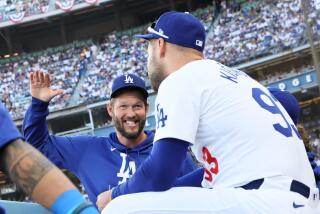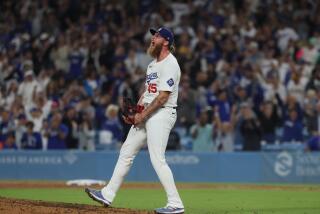Karros Has Unleashed a Productive Season Even Without a Lot of Homers
- Share via
Eric Karros says now that his reaction to the meeting with Manager Jim Tracy was one of shock and disappointment.
He wasn’t angry as much as annoyed.
It never occurred to him, he says in reflection, that he was being graded in spring training.
All he was trying to do, in the aftermath of a painful 2001 season and an off-season dedicated to correcting the back problem that had pulled the plug on his power and production, was stay healthy and recapture his timing for the start of the new season.
Tracy and General Manager Dan Evans had other thoughts, though, when they met with Karros during the last week of the Dodgers’ 2002 spring bivouac.
Their 34-year-old first baseman was coming off his worst season--.235 average, 15 home runs, 63 runs batted in--and was about to finish the exhibition schedule with a .190 average, no home runs and three doubles, which had them nervous.
“I think ‘concerned’ would be the best word,” Tracy said, looking back.
Karros, looking back from the perspective of a promising half-season, said he didn’t consider what he is doing now to be redemption as much as surviving.
“I knew coming out of spring training that I wasn’t going to be given a very long leash,” he added. “There was no question that a lot of people had written me off, had doubts about me, including the guy sitting in that [manager’s] office right over there.
“I knew, with the impression people had, considering the emphasis they were putting on my spring numbers, I’d better get off to a decent start or it would be a very long year. I knew the leash wouldn’t stretch very far.”
Karros, though, might have stretched the leash farther than skeptics would have predicted.
He opened the season hitting seventh--”That was a blow to the ego right out of the chute,” he said--and is now hitting fourth, which is not to say he is the same middle-of-the-order power hitter who slugged 31 homers in 2000 and 34 in 1999, driving in 218 runs in those two seasons.
Nor is he the power-emphasizing hitter who averaged 27 homers and 93 RBIs while batting .270 for nine consistent seasons before the back problems of last year.
The emergence of Karros as cleanup hitter in a lineup that had been a work in progress and has helped bolt the Dodgers into the National League West lead stems basically from two factors:
* Reacting to what he believes to be Tracy’s vision of his offensive personnel and attack, Karros has tried to become a more disciplined contact hitter, one who cuts down on his swing and strikeouts, uses the entire field but is still focused on driving in runs.
“[I] can be more beneficial on the type club we have now by just putting the ball in play, moving runners, keeping an inning going instead of swinging for the fences,” he said. “Which is not to say there won’t be times when I try to go for it.”
* Among the Dodgers, with Mike Piazza, Raul Mondesi and Gary Sheffield playing elsewhere, only Shawn Green has the capability to carry a club for more than a few games at a time, leaving the manager with few cleanup options other than Karros, whose adjustment to his new approach convinced Tracy he could still be productive in the middle, even if he wasn’t hitting 30 home runs.
The Dodgers reach the midpoint of a 162-game schedule Sunday, and Karros has eight home runs and 38 RBIs--far below his pre-2001 production. But he is batting .303 ( his career high is .304 in 1999), has a .328 average with runners on base, a .329 average with runners in scoring position, and has struck out only 34 times in 274 at-bats.
“What we saw in spring training would not have correlated to what we’ve seen since the season started,” Tracy said. “I like what the man is doing right now.
“Hypothetically, if he hits 14 or 15 home runs, great. If he continues to get up in bases-loaded situations and they make that tough slider pitch down and away and he continues to hit line drives over the second baseman’s head, I like that player more than the guy who was hitting 30 home runs and batting .257 and striking out over 100 times because how many of those strikeouts ended rallies? And how many of the 30 homers were hit like those singles with the games on the line?
“We would not be [20] games over .500 without his production and he’s sent a very loud message, to me and everybody who witnessed what he did in the spring, as to what kind of professional he is.”
Karros smiled, amused by the irony.
There were all those years when he thought he could have hit .300 if he had wanted but considered batting average to be “one of the most overrated statistics in baseball.” His primary responsibility, he believed, was producing decent power numbers, ultimately becoming the L.A. Dodgers’ career leader in home runs.
“Could I still hit 30 home runs if I wanted?” Karros, a career .269 hitter, asked. “Without question. But I’d probably throw in 120 strikeouts too, and right now, where I’m on a pace for 70 or 80 strikeouts, I think that helps this club more.
“I also knew that if I came out hitting a few home runs and batting .250, a lot of people around here would have said I was done. I didn’t want to contribute to that and I don’t think I could have handled another year like last year mentally.
“I don’t want to go out sitting on the bench. I want to go out on top, with the club winning. I’ve been around .300 most of the time, tried to stay consistent, and feel like I’m playing better than I have in the last few years.”
Karros is owed $8 million next year and the club has a $9-million option or $1-million buyout in 2004. He put himself in position to confront the skeptics through his off-season work with Vancouver therapist Alex McKechnie and believes his balance at the plate and flexibility at first base have improved.
How far his new approach takes him, however, remains a daily challenge.
He’d had only four hits in his last 26 at-bats as he faced the Angels on Friday night, but he has continued to make contact and he continues to delight in the team’s performance and chemistry.
Karros is seldom without a smile, in the clubhouse or dugout. Maybe no one could have predicted how that part of it would develop, but he thought of his spring meeting with Tracy.
“I told him that by the end of the year, I’d be hitting fifth,” Karros said. “We had Green and [Paul] Lo Duca coming off great years, so I didn’t say I’d be hitting fourth, but I did predict he’d be hitting me in the middle of the order and he looked at me and said, ‘I hope you’re right,’ but I don’t think he or anybody believed
it.
“His attitude seemed to be, ‘You’ve got to be kidding me, after what I’ve been watching.’ But again, I didn’t know I was being graded on what I was doing in spring training.”
The batting order is one measure of his midseason grade.
Another?
“He’s put all the concern to bed,” Tracy said. “The leash is a little longer.”
*
(BEGIN TEXT OF INFOBOX)
*
On the Upswing
*
Eric Karros is following up the worst of the 11 major league seasons in which he has played regularly with one that could rank as one of his best in categories such as hits, batting average, strikeouts and double plays hit into.
(text of infobox not included)
More to Read
Are you a true-blue fan?
Get our Dodgers Dugout newsletter for insights, news and much more.
You may occasionally receive promotional content from the Los Angeles Times.









